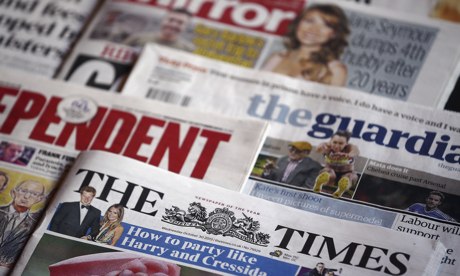Special rapporteur on freedom of expression says he is alarmed at political response to revelations of mass surveillance

Frank La Rue said the UK's reputation for investigative journalism was under threat from the government's response to Snowden's revelations. Photograph: Dan Kitwood/Getty Images
A senior United Nations official responsible for freedom of expression has warned that the British government's response to the mass surveillance revealed by Edward Snowden is doing serious damage to the UK's international reputation for investigative journalism and press freedom.
Frank La Rue, the UN special rapporteur on freedom of expression, said he was alarmed at the political reaction following the revelations about the extent and reach of secret surveillance programmes run by Britain's eavesdropping centre, GCHQ, and its US counterpart, the National Security Agency (NSA).
"I have been absolutely shocked about the way the Guardian has been treated, from the idea of prosecution to the fact that some members of parliament even called it treason," said La Rue. "I think that is unacceptable in a democratic society."
La Rue's intervention comes as a delegation of the world's leading editors and publishers prepares for a "press freedom mission" to the UK to raise their own concerns about the British government's position.
Organised by the World Association of Newspapers and News Publishers (WAN-IFRA), the delegation will arrive in January and include publishers and editors from five continents. WAN-IFRA says the mission is the first of its kind to the UK and has been prompted by growing concerns about UK government interference in press regulation and the political pressure on the Guardian. The delegation is expected to meet government and opposition leaders, press industry figures and civil society organisations.
"We are concerned that these actions not only seriously damage the United Kingdom's historic international reputation as a staunch defender of press freedom, but provide encouragement to non-democratic regimes to justify their own repressive actions," said Vincent Peyrègne, chief executive of the Paris-based WAN-IFRA.
The Guardian, and major media organisations in other countries, including the New York Times and the Washington Post, began disclosing details of the extent and reach of secret surveillance programmes run by GCHQ and the NSA in June.
The articles have sparked a global debate on the scale and oversight of surveillance by the US and UK intelligence agencies. However, in the UK there has been growing political pressure on the Guardian, with calls for it to be prosecuted, a decision to call the editor, Alan Rusbridger, to give evidence to the home affairs select committee and a warning from David Cameron that he would take "tougher measures" against the newspaper unless it demonstrated "some social responsibility".
On Friday the New York Times voiced its concern over the political climate in the UK. In an editorial entitled "British press freedom under threat" it stated: "Britain has a long tradition of a free, inquisitive press. That freedom, so essential to democratic accountability, is being challenged by the Conservative-Liberal Democrat coalition government of Prime Minister David Cameron."
It pointed out that unlike the US, Britain has no constitutional guarantee of press freedom. "Parliamentary committees and the police are now exploiting that lack of protection to harass, intimidate and possibly prosecute the Guardian newspaper for its publication of information based on National Security Agency documents that were leaked by Edward Snowden … The global debate now taking place about intelligence agencies collecting information on the phone calls, emails and internet use of private citizens owes much to the Guardian's intrepid journalism. In a free society, the price for printing uncomfortable truths should not be parliamentary and criminal inquisition."
In an interview with the Guardian La Rue said the political fallout in the UK was unacceptable.
"When you are in public office you understand that the role of the press is to investigate things that are done right or things that are done wrong and make it known to the public. And if you are in office you know that you come under public scrutiny and public scrutiny comes with public criticism and you cannot use national security as an argument and much less challenge as treason something that is informing the public, even if it is embarrassing information for those that are in office."
No comments:
Post a Comment